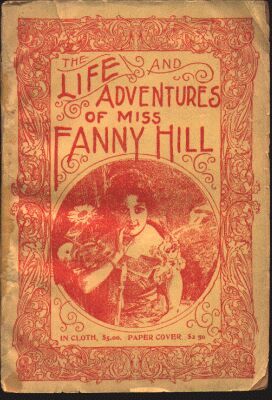Probably the most famous pornographic novel in English literature is John Cleland’s Memoirs of a Woman of Pleasure, published in 1748 and 1749. It is the first-person narrative of a young woman’s adventures as a prostitute after losing her virginity to a gentleman who claimed to be in love with her.
Fanny Hill author prosecuted for obscenity in Britain
The novel describes scenes of lesbianism, flagellation, group sex, and male homosexuality, emphasizing throughout the size and appearance of the male genitalia. Some 70 years later, illustrations from later reprints of the book led to one of the earliest obscenity cases in the United States.
Cleland reportedly sold the copyright to the book for 20 guineas to escape debtor’s prison, and the publisher, Ralph Griffiths, made a profit large enough to allow him to launch The Monthly Review, one of the first major literary periodicals in England.
Although Memoirs was published anonymously and with a pseudonymous imprint, Cleland and Griffiths were prosecuted in Britain for obscenity in November 1749; they managed, however, to avoid punishment.
In 1750 Griffiths released an expurgated edition of the book, titled The Memoirs of Fanny Hill; the novel went through frequent illicit reprints (many of them illustrated) over the next two centuries.
Fanny Hill led to early American obscenity case, legal standard for obscenity
In one of the earliest obscenity cases in the United States, Commonwealth v. Holmes (1821), the Supreme Court of Massachusetts upheld the conviction of individuals who had shown an illustration from the book. Almost 150 years later, Putnam’s 1963 publication of the book led to the decision in Memoirs v. Massachusetts (1966), in which the Supreme Court ruled the book not to be obscene and articulated a legal standard for determining when material crossed the line into obscenity.
Fanny Hill belongs to the same literary historical moment as Samuel Richardson’s Clarissa (1747–1748), Tobias Smollett’s Roderick Random (1748), and Henry Fielding’s Tom Jones (1749).
This article was originally published in 2009. Simon Stern is Professor of Law and English at the University of Toronto. He has published articles and book chapters on obscenity, copyright, criminal procedure, legal fictions, and the history of the common law.

